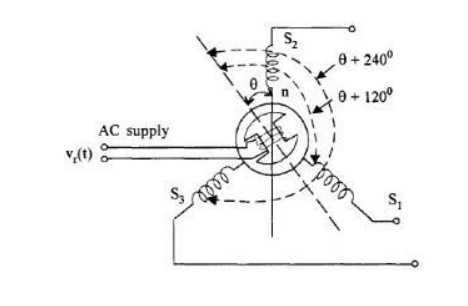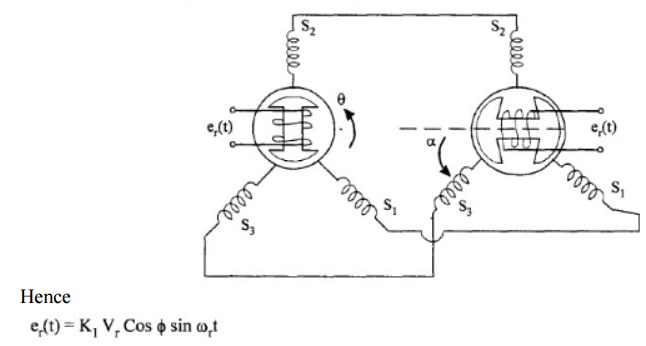Chapter: Control Systems : Systems and their Representation
Synchros
Synchros
A
commonly used error detector of mechanical positions of rotating shafts in AC
control systems is the Synchro.
It
consists of two electro mechanical devices.
o
Synchro transmitter
o
Synchro receiver or control transformer.
The
principle of operation of these two devices is sarne but they differ slightly
in their construction.
o
The construction of a Synchro transmitter is
similar to a phase alternator.
o
The stator consists of a balanced three phase
winding and is star connected.
o
The rotor
is of dumbbell
type construction and is wound
with a
coil to produce a magnetic field.
o
When a no voltage is applied to the winding of the
rotor, a magnetic field is produced.
o
The coils in the stator link with this sinusoidal
distributed magnetic flux and voltages are induced in the three coils due to
transformer action.
o
Than the three voltages are in time phase with each
other and the rotor voltage.
o
The magnitudes of the voltages are proportional to
the cosine of the angle between the rotor position and the respective coil
axis.
o
The position of the rotor and the coils are shown
in Fig.


When q=900
the axis of the magnetic field coincides with the axis of coil S2 and maximum
voltage is induced in it as seen.
For this
position of the rotor, the voltage c, is zero, this position of the rotor is
known as the 'Electrical Zero' of die transmitter and is taken as reference for
specifying the rotor position.
In
summary, it can be seen that the input to the transmitter is the angular
position of the rotor and the set of three single phase voltages is the output.
The magnitudes of these voltages depend on the angular position of the rotor as given

Now consider these three voltages to he applied to the stator of a similar device called control transformer or synchro receiver.
The
construction of a control transformer is similar to that of the transmitter
except that the rotor is made cylindrical in shape whereas the rotor of transmitter
is dumbbell in shape.
Since the
rotor is cylindrical, the air gap is uniform and the reluctance of the magnetic
path is constant.
This
makes the output impedance of rotor to be a constant.
Usually
the rotor winding of control transformer is connected teas amplifier which
requires signal with constant impedance for better performance.
A synchro
transmitter is usually required to supply several control transformers and
hence the stator winding of control transformer is wound with higher impedance
per phase.
Since the
some currents flow through the stators of the synchro transmitter and receiver,
the same pattern of flux distribution will be produced in the air gap of the
control transformer.
The
control transformer flux axis is in the same position as that of the synchro
transmitter.
Thus the
voltage induced in the rotor coil of control transformer is proportional to the
cosine of the angle between the two rotors.
Related Topics